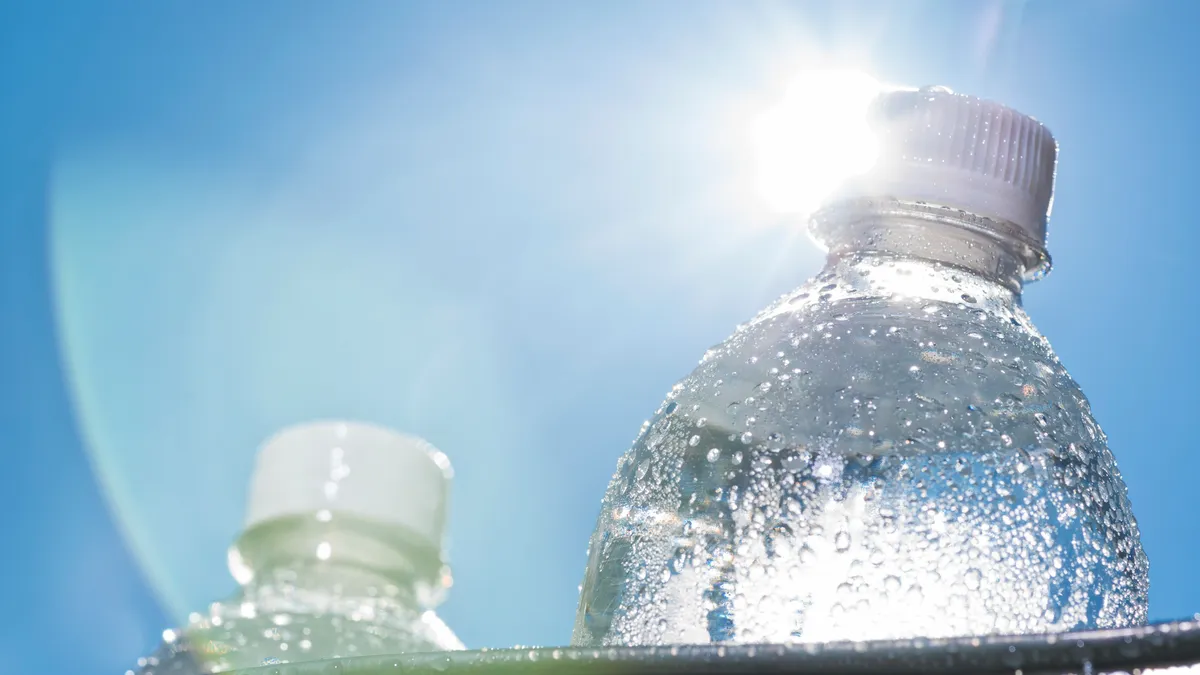Dive Brief:
- A federal judge in the U.S. Northern District Court of Illinois dismissed a class action lawsuit against BlueTriton Brand earlier this month that alleged they believed the company’s Ice Mountain bottled water contained microplastics, and thus deceptively markets itself as “100% natural spring water.”
- In an Aug. 9 ruling, U.S. District Court Judge Steven Seeger said the argument against the Connecticut-based bottled water company — which also owns brands like Deer Park and Poland Spring — is preempted by the Food, Drug and Cosmetic Act of 1938.
- Seeger’s dismissal said the Food and Drug Administration has defined the term “spring water,” and that definition “doesn’t say anything about the existence of microscopic particles.” The ruling, though “skeptical” of their odds, left leave for the plaintiffs to amend their argument, and an amended complaint filed Friday sought to plug the holes in their argument.
Dive Insight:
Christine Slowinski and David Hayes first brought the claim, alleging deceptive marketing under Illinois law and the common law in state court, before BlueTrition — a spinoff of Nestle’s North American bottled water business — moved to have the case transferred to federal court. As a class-action case, BlueTriton successfully argued federal courts have proper jurisdiction, and the case has been on the Northern Illinois District Court docket — where the plaintiffs reside — since January.
Slowinski and Hayes said they bought bottles of Ice Mountain in an Illinois grocery store, and paid a premium due to the labeling, but later came to conclude that their water included microplastics, which can leach out from plastic bottles to water, as all parties agree, according to the dismissal.
Seeger was skeptical about how they came to the conclusion that their bottles of water in particular were contaminated. While both the initial and amended complaint list a 2018 Orb Media study that tested water bottles from 11 brands and found 93% had microplastics present.
However, Seeger’s Aug. 9 dismissal noted the study did not include Ice Mountain and Slowinski and Hayes did not further explain how they tested the products they bought for microplastics “or that they tested any Ice Mountain water for microplastics, at all.”
While Seeger agreed with research about the growing prevalence of microplastics and their unknown long-term health effects, he said Congress has left the Food and Drug Administration with the authority to define terms for food and beverage consumption.
Seeger called the complaint “full of holes” and said he “has significant doubts about [the plaintiffs’] ability to plug them,” but ultimately gave the plaintiffs two weeks to amend their complaint.
“The Court is skeptical that Plaintiffs can avoid the FDCA’s preemption bar,” Seeger wrote. “And Plaintiffs’ theory of the case – i.e., that BlueTriton misled consumers about microplastics in their water – seems inconsistent with the reality that microplastics are in everything.”
Slowinski and Hayes’ amended complaint, obtained by ESG Dive, focused on the “100% natural” part of Ice Mountain’s label, and argued that “bottled water that is contaminated with microplastics is not “100% Natural” Spring Water, nor is it “100%” water.”
“Reasonable consumers do not expect ‘100% Natural’ products to contain synthetic contaminants because the term ‘100%’ indicates to consumers that all parts of the products, including all contents, will be natural,” the Aug. 23 filing said.
The amended complaint also noted the FDA has not officially defined the word “natural” and only has a non-binding policy on the term with no mention of claims like “100% natural.” The complaint said BlueTriton’s “100% natural” labeling “conveys information beyond the scope of federally approved ‘spring water’ labeling.”
Slowinski and Hayes are looking to represent a class of all U.S. purchasers of the product of five years prior to the complaint’s filing through the class certification, as well as a subclass of all Illinois purchasers over that same time span.
Earlier this year, BlueTriton announced a merger with Primo Water, which owns brands including Mountain Valley and Crystal Springs, that is expected to have a combined net revenue of $6.5 billion after closing.












